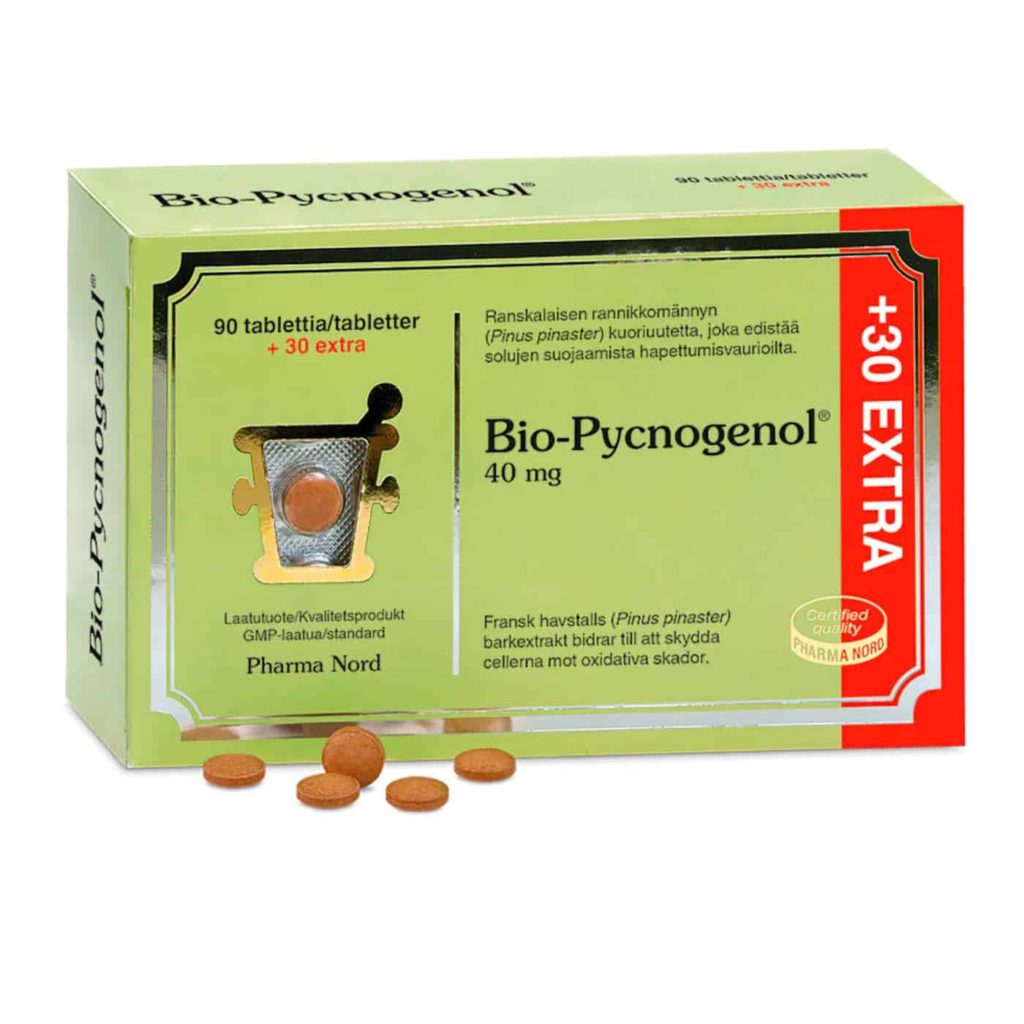Bio-Pycnogenol 40mg
Bio-Pycnogenol®
- Contains 40 mg of standardized, patented extract
- French coastal pine Pinus pinaster bark extract acts as an antioxidant, promoting health by protecting cells from oxidative damage
- Strong antioxidant
- Clinically tested
What is Pycnogenol®?
Pycnogenol® is a patented extract made from the bark of the French coastal pine (Pinus pinaster). The procyanides it contains bind to the water- and fat-soluble parts of cells and protect them from damage caused by free radicals. In addition, Pycnogenol® supports functioning blood circulation.
Asthma, high cholesterol, memory loss, ADHD, and many other disorders are treated using maritime pine bark extract, however many of these applications lack solid scientific backing.
The bark of the tree contains plenty of different types of bioflavonoids, some of which are naturally occurring antioxidants, as well as several fruit acids.
Pycnogenol® has been on the market for over 40 years and has been studied in several scientific studies.
Why choose Bio-Pycnogenol®?
Bio-Pycnogenol® is a useful food supplement for those who want to increase their intake of good-for-you procyanides. Pycnogenol® extract is made from French coastal pine, which grows only in Les Landes de Gascogne forest in the south-west of France. This forest is completely unspoilt and natural and no pesticides or herbicides have been used.
Formula
1 tablet contains 40 mg of French coastal pine (Pinus pinaster) bark extract.
Ingredients
Bulking agent (microcrystalline cellulose), anti-caking agent (maltodextrin (corn)), coastal pine bark extract Pycnogenol®, surface treatment (hydroxypropyl methylcellulose), firming agent (tricalcium phosphate), anti-caking agent (magnesium salts of fatty acids).
Daily Intake
Take 2 tablets twice a day for the first week, then continue with 1 tablet twice a day.
Warning/ Cautions
Pycnogenol, a maritime pine bark extract, may be safe when taken daily in amounts of 50–450 mg for up to a year. Some people may have nausea and gastrointestinal issues as a result.
Pregnancy and Breast-feeding
Pycnogenol, a specific maritime pine bark extract, may be safe to take when administered toward the end of pregnancy. However, it should be used with caution or avoided during pregnancy until more is understood. There isn’t enough trustworthy data to determine whether marine pine is safe to use while nursing. Avoid use to be on the safe side.
Children
Pycnogenol, a marine pine bark extract, may be safe for children aged 6 to 18 to use orally for up to three months.
Immune System
Maritime pine may boost the immune system’s activity, which could exacerbate the symptoms of “auto-immune disorders” including multiple sclerosis (MS), lupus (systemic lupus erythematosus, SLE), rheumatoid arthritis (RA), or other conditions. It is advised to steer clear of utilizing maritime pine if you have one of these ailments.
Bleeding disorders and Surgery
High doses of maritime pine may make patients with bleeding disorders more likely to bleed.
Maritime pine may reduce blood sugar and impede blood coagulation. There is some worry that it could lead to dangerously low blood sugar levels and raise the risk of bleeding both before and after surgery. Stop utilizing maritime pine at least two weeks in advance of the procedure.
Pycnogenol® is a registered trademark of Horphag Research Ltd. Product features are protected by U.S. with Patent Nos. 5,720,956; 6,372,266 and 6,565,851.
